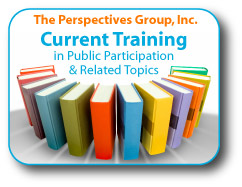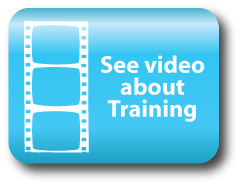Working with The Media (one day)
At the end of this training, students will understand how to better prepare information for use by the media, talk to reporters effectively, and engage the media as a useful communications partner. The course is highly interactive. Students will use real-life situations to practice and engage in the learning points. Topics covered include:
- Understanding the media
What is news?
- How do journalists think?
What do they want from you?
- Basic Communications
How the process of communications works
Applying the process to your communications
- Media Basics
What to do
What not to do
- Developing Your Message
Key messages
Reaching your intended audience
Keeping it simple
- Mastering the Interview
Getting prepared
Staying focused
Avoiding traps
- Creating Effective Media Tools
The Press Release
The Press Kit
Your Web Site
Elements of Meaningful Public Participation (two days)
This course provides an overview and framework for conducting effective and meaningful public participation. It presents a well-organized approach to public participation by presenting the eight elements of meaningful participation. It places focus on practical understanding of public participation and helps participants to explore a wide range of issues including:
- What is public participation?
- How do we engage the public to help us make better decisions?
- Where is public participation appropriate and how do we make this determination?
- What makes organizations credible and trustworthy?
- How do we design public participation for meaningful results?
- How do set clear goals and expectations?
- Overview of best practices in planning, design, and implementation
- How to avoid common mistakes.
Planning for Meaningful Public Participation (two days)
Building on the elements of meaningful public participation, this course leads students through a detailed understanding of how to plan for effective public participation processes. Planning for effective public participation requires significant effort. The success and failure of public participation is largely determined in the level and appropriateness of the effort in planning. Topics covered in this class include:
- How to prepare for planning and engaging the public
- How to identify stakeholders and stakeholder interests
- The importance of convening balanced and representative stakeholders
- How to incorporate public participation activities into the decision process
- Select the appropriate level of public participation
- Establish clear goals and objectives
- Match tools and techniques to public participation goals
- Identifying and budgeting for necessary resources
- The importance of evaluation.
Planning and Facilitating Effective Public Meetings (two days)
Effective dialogue is the centerpiece of any public participation program. Too often, however, planners rely on traditional public meeting formats that simply do not work. Creating effective forums for dialogue require an understanding of how people communicate and the environments in which real dialogue can take place. This course explores the fundamentals required to design and implement forums for genuine and productive dialogue. Topics include:
- Characteristics of Effective Dialogue
- How to Establish an Environment for Effective Dialogue
- Reinventing the Public Meeting
- The Five principles of planning effective meetings
- Basics of Meeting Facilitation.
Designing and Managing Effective Citizen Advisory Groups (one day)
Advisory boards can be the heart of higher level public participation programs, but often fail to achieve a common approach or vision to assist decision-makers. This course looks at what makes advisory boards work and provides students with the knowledge and skills they need to convene healthy, functional boards. Topics covered include:
- What are advisory groups?
- Where are advisory groups appropriate and how do we make this determination?
- What makes advisory groups work?
- Common mistakes that lead to dysfunctional boards
- Convening a balanced, responsible membership
- Creating a mission, charter, and groundrules
- The roles of members, chairperson, and facilitator
- Attention to detail: getting the small things right
- The importance of shared learning
- Seeking and achieving consensus.
Communications for Public Participation (two days)
Creating effective relationships with the public, listening to public concerns, and conveying information are all critical components of effective communication for public participation. This course provides students with the skills they need to communicate effectively with the public. Topics include:
- How Communication Works
- Keys to Effective Communication
- Active Listening
- An Introduction to Dialogue
- Effective Presentations
- Dealing with Difficult People
- Media Relations
- Risk Communication.
International Association for Public Participation Certificate Course in Public Participation (one week)
Doug Sarno of The Perspectives Group was an original designer and is a Master Trainer for this internationally renowned course. It presents a model for how to conduct effective public participation through three modules: Planning, Communications, and Techniques. Over five days it covers all aspects of public participation through a highly interactive program. Topics include:
- The full scope of planning needed for effective participation, including information, timing, resources, techniques, and roles and responsibilities
- A variety of ways to identify the public and understand potential impacts of actions
- How to select the appropriate level of public participation
- How to set clear, shared objectives for effective participation
- How to develop a public participation plan
- How to identify appropriate evaluation tools to measure the effectiveness of public participation programs
- An understanding of the communication skills needed to support effective public participation
- How to use appropriate communication skills, behaviors and tools to support effective public participation
- How to create effective forums for dialogue and how to avoid the many problems encountered in traditional public meetings
- How to use various techniques to:
- Promote awareness by sharing information
- Gather broad-based feedback
- Foster meaningful discussion
- Facilitate agreement
- Provide effective forums for public discussion.
The Perspectives Group is currently offering the IAP2 Certificate Course
in Public Participation on the following dates:
Alexandria, Virginia - Douglas J. Sarno, trainer
September 15-19, 2008
Location:
Holiday Inn
625 First Street
Alexandria, VA 22314
December 1-5, 2008
Location:
Crowne Plaza
901 North Fairfax Street
Alexandria, VA 22314
|




